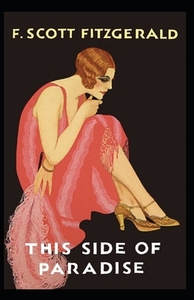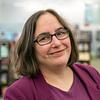Take a photo of a barcode or cover
I’m not a massive Fitzgerald fan and I’m the first to admit that – although I enjoyed Gatsby I more enjoyed the THOUGHT of reading The Great Gatsby rather than the actual experience, I liked John Green talking about Gatsby. BUT like Austen I preferred watching it to reading it, and with it being so short you can almost succeed in doing both in under six hours.
I really want to be one of those people that feel Fitzgerald is the greatest writer that ever lived, because I’m in love with the idea of the 20’s, albeit as long as I was rich. And Gorgeous, in fact if you shoved me into any novel I’d like it to be Gatsby even if it was just as a guest at one of his large parties brimming with secrets and people, I’d be the red head in the beaded dress drinking a martini.
Anyway!
However much I try and like "The Great Gatsby" I must admit “This Side of Paradise” felt different, I can’t put my finger on it but I enjoyed it, It seems to me that Fitzgerald writes for Style rather than substance, BUT this was the 20’s the era of Flappers and Moet, it was the time for the rich to be rich, and the poor (in these novels at least) to go unnoticed and I must admit Fitzgerald wrote about the rich very well. However even the style was somewhat lacking in this book, the writing felt... irregular kind of jumbled it didn’t all ‘gel’. I can’t think of a better way to explain it.
Amory Blaine reminded me in a way Of Holden (Catcher in the Rye) similar to Holden in the fact that I didn’t like him mostly due to the fact they’re both self obsessed, this resemblance is also deepened by the fact that it’s in many ways a coming of age story, so in many ways they echo each other. Dissimilar to Holden however Amory actually believes in himself and tries to achive something rather than just sulking in a park and calling others ‘phoneys’ – not that he succeeds a great lot but still the will is there...
However, breaking the bonds go the stereotypical roaring 20s and the American Dream – Money made Amory Blaine unhappy, seeing as this is supposedly slightly autobiographical I think it’s important to take this into account. Although I’m sure Amory would have felt a little different if he’d been raised with nothing – just my opinion.
I also fell in love with the story surrounding the novel, as The Great Gatsby depicted the breakdown of F. Scott Fitzgerald’s and Zelda Sayre’s relationship this side of Paradise is the novel that bought them back together.
I really want to be one of those people that feel Fitzgerald is the greatest writer that ever lived, because I’m in love with the idea of the 20’s, albeit as long as I was rich. And Gorgeous, in fact if you shoved me into any novel I’d like it to be Gatsby even if it was just as a guest at one of his large parties brimming with secrets and people, I’d be the red head in the beaded dress drinking a martini.
Anyway!
However much I try and like "The Great Gatsby" I must admit “This Side of Paradise” felt different, I can’t put my finger on it but I enjoyed it, It seems to me that Fitzgerald writes for Style rather than substance, BUT this was the 20’s the era of Flappers and Moet, it was the time for the rich to be rich, and the poor (in these novels at least) to go unnoticed and I must admit Fitzgerald wrote about the rich very well. However even the style was somewhat lacking in this book, the writing felt... irregular kind of jumbled it didn’t all ‘gel’. I can’t think of a better way to explain it.
Amory Blaine reminded me in a way Of Holden (Catcher in the Rye) similar to Holden in the fact that I didn’t like him mostly due to the fact they’re both self obsessed, this resemblance is also deepened by the fact that it’s in many ways a coming of age story, so in many ways they echo each other. Dissimilar to Holden however Amory actually believes in himself and tries to achive something rather than just sulking in a park and calling others ‘phoneys’ – not that he succeeds a great lot but still the will is there...
However, breaking the bonds go the stereotypical roaring 20s and the American Dream – Money made Amory Blaine unhappy, seeing as this is supposedly slightly autobiographical I think it’s important to take this into account. Although I’m sure Amory would have felt a little different if he’d been raised with nothing – just my opinion.
I also fell in love with the story surrounding the novel, as The Great Gatsby depicted the breakdown of F. Scott Fitzgerald’s and Zelda Sayre’s relationship this side of Paradise is the novel that bought them back together.
Damn, this was a great read.
"Youth is like having a big plate of candy. Sentimentalists think they want to be in the pure, simple state they were in before they ate the candy. They don't. They just want to repeat the fun of eating it all over again."
"Youth is like having a big plate of candy. Sentimentalists think they want to be in the pure, simple state they were in before they ate the candy. They don't. They just want to repeat the fun of eating it all over again."
Just couldn't get through this. Seemed very slow and Amory was just too narcissistic and pretentious. I know that was the point, but I just found him (and his mother Beatrice) absolutely insufferable after only 20 pages. Tried switching from audio to print - that didn't help. As a former English major, I feel as if I should like this more, but I just can't.
emotional
reflective
medium-paced
Plot or Character Driven:
A mix
Strong character development:
Yes
Loveable characters:
No
Diverse cast of characters:
No
Flaws of characters a main focus:
Yes
A story of a boy's journey to manhood on the verge of the Jazz age. At the time it was published this book was a revelation into the Jazz Age/Flapper generation, the generation that survived WWI and headed into Prohibition.
It is difficult today to see the significance of this novel, to see how shocking it was... but at the time it was a window into the lives of the youth of a new (and some saw as reckless) generation.
It was difficult at times to get through the book- Fitzgerald loves his metaphors and his grandstanding on philosophical topics.... the whole section with Roselind was unique as dialouge was mostly written as- Him: Do not talk like that. Her: Why not? It is true isn't it?
It is difficult today to see the significance of this novel, to see how shocking it was... but at the time it was a window into the lives of the youth of a new (and some saw as reckless) generation.
It was difficult at times to get through the book- Fitzgerald loves his metaphors and his grandstanding on philosophical topics.... the whole section with Roselind was unique as dialouge was mostly written as- Him: Do not talk like that. Her: Why not? It is true isn't it?
This Side of Paradise follows the young life of Amory Blaine as he breaks from childhood and into the stage where one is being educated and is free to make decisions, but doesn't feel yet like an adult. Amory experiences many people from all walks of life; he experiences religion, rejection of religion, childishness, falling in and out of love, reckless living and careful living, and these people and experiences roll over him, yet all leaving some mark on his character. What is his conclusion from this vantage point, though? Does he become disillusioned with the hypocrisy and sameness of everything he sees, or does he realize in the end that life is a mess of all of these things and if it weren't so it wouldn't be life? Through Amory we get a view of Fitzgerald's young perspective, as he seems to see the world as a great cog of Time, spinning and running itself faster and broader. Amory seems to have been educated, but not prepared for the world, and he looks at the way it turns, and sees his generation turning itself over into a new generation of ambitious minds, and yet every other generation preceding has had the same ambition, and each turning in the end is a new variation on an old theme. Amory has lived youth and experienced youth, and the young Fitzgerald writing is perhaps asking the same question of the world as a somewhat jaded and lost Amory asks, "What now do I do with all I have learned and seen?"
I love Fitzy but boy did this draaaaaaaaag in the beginning. I get the childhood reverie, untouched by war, etc etc but seriously were the college bro adventures boring. Hell of a good closing line though.
I could see the potential in the writing but it seemed more of an experimental novel. I struggled with this book - especially with the narrator.





